On February 1, 1985, or 38 years ago this week, the mighty Crispa Redmanizers left the PBA after disbanding and selling its franchise to Shell Chemicals, then a 60 percent locally-owned company, primarily offering agricultural products.
The Redmanizers left the league after establishing themselves as the greatest PBA franchise ever, winning 13 championships in 10 seasons, four more than their arch-rivals, the Toyota basketball team. Curiously, in the same month of the previous year, Toyota also disbanded and sold its franchise to Basic Holdings, Inc.
For its Throwback Thursday feature, The Rivalry recounts the events that led to the disbandment of the Floro-owned enterprise.
Economic crisis
The collapse of the Philippine economy in the aftermath of the Ninoy Aquino assassination in 1983 took a hit on several local companies, particularly those in the garment industry. Crispa, then one of the leading clothing companies in the country, was not spared. Yet, despite the difficulties, owner and team manager Danny Floro labored on. As a result, the team still ended up winning the grand slam in 1983 and the All Filipino title of 1984.
When Floro made the announcement to the media, he clarified that Crispa’s disbandment is “merely temporary, and that we will not be playing in the First Conference (of the 1985 season).” Floro added, “If we get new players from the amateur pool released by the PBA, we might field a young team in the second or third conference.” This announcement buoyed the spirits of millions of Crispa fans mourning for the loss of their beloved team.
The sale
Shell Chemicals was part of the foreign-based Shell fuel company, whose local rights were owned by the Ayala family. Considering that Shell wasn’t directly involved in sports, particularly basketball at the time, it came as a surprise that they were taking over the Crispa franchise. Floro mentioned that the deal was negotiated by the PBA, acting in Crispa’s behalf, directly with Shell officials. “I gave them (PBA officials) the blanket authority to negotiate for us. Whatever the PBA decides will be binding on Crispa.”
The deal could not have come at a more perfect time. In 1984, the PBA had seven teams – league pioneers Crispa, Tanduay, Great Taste, and San Miguel (Gold Eagle). The other three were Gilbey’s Gin, which joined the league in 1979, Beer Hausen, which secured the Toyota franchise that season, and the Sanyu Goup, which carried the brand Countryfair Hotdogs. The Sanyu Group joined the PBA in 1983 carrying multiple brands – Manhattan Shirts, Winston Kings and Sunkist Orange.
But Countryfair folded up immediately after the 1984 season and the league was left with only six teams. Crispa’s disbandment would have brought several complications to the league as there would only be five teams remaining – an untenable situation to run a credible professional tournament.
But the PBA officials, under Commissioner Mariano Yenko and his deputy, then presidential son-in-law Tommy Manotoc, worked quietly after Floro intimated to them a few weeks prior to the announcement of their intent to sell. Manotoc, who led the Redmanizers to the 1983 grand slam conquest, took the lead and was primarily responsible for bringing the Ayala family into the PBA. It took weeks of wheeling and dealing until the deal was finally consummated.
Floro, though, clarified that “the sale of the Crispa franchise is without prejudice to the team’s rejoining the league anytime under the same conditions and privileges as a charter member.” This was what Floro sought out from Manotoc, to which the latter readily agreed.
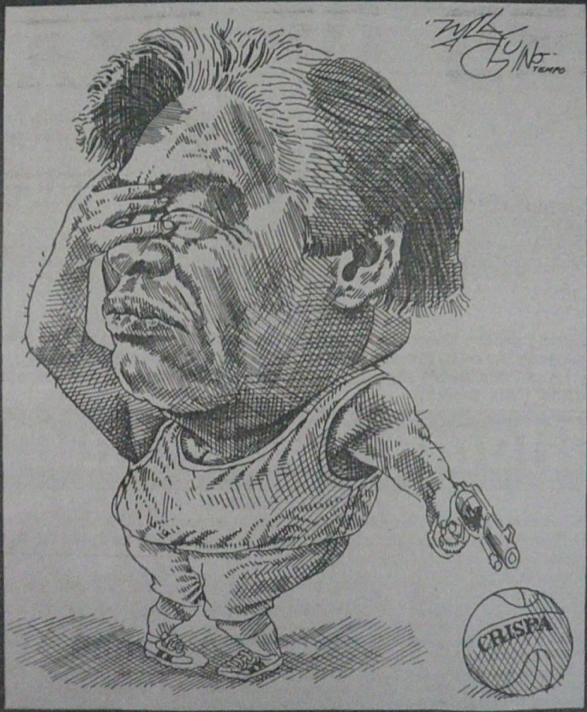
Player dispersal
While many companies would have loved to retain the core of the Redmanizers as the players were part of the sale, Shell apparently preferred a young team. There was a concession that Shell would get at least four of the 16 amateur players who joined the league via the first ever PBA draft, including the top draft pick. Since all the Crispa contracts had to be honored by Shell, it was decided that these players could be shipped to other teams by giving draft concessions for the new franchise.
Manotoc, who had long advocated for league parity ever since he was coaching the U/Tex Wranglers before moving to San Miguel Beer and Crispa, viewed Shell’s preference as an opportunity instead of a problem. Had Shell retained the core of the Crispa team, they would have easily become championship contenders from the get go. But because Shell preferred to run a young team, Manotoc took advantage by dispersing the Crispa stars to different teams that will hasten league parity.
As such, the original plan was to bring in only five players from Crispa – Bay Cristobal, Padim Israel, Willie Pearson, Lim Eng Beng and Fritz Gaston. Shell officials sought Manotoc’s advice regarding the remaining players.
In the end, only Cristobal was secured by the new team. Israel went on to play for Tanduay, Pearson joined Great Taste, Gaston found a place at Manila Beer (formerly Beer Hausen) while Lim opted to retire. After Shell selected Philip Cezar, Bernie Fabiosa and Jimmy Javier to join Cristobal in the team, the rest were distributed to other teams. Atoy Co, Yoyoy Villamin and Gaston went to the Brewmasters, Abet Guidaben, Freddie Hubalde, Tito Varela and Padim Israel suited up for Tanduay, Pearson further solidified Great Taste’s backcourt, while Beng retired but returned in 1986 to play for Manila Beer.
Meanwhile, when Bogs Adornado, who played for Crispa from 1975 to 1979, opted to leave Great Taste, a team he joined in 1983, he was already close to signing a contract to play for Ginebra prior to the start of the 1985 season, but a last-minute phone call prevented the deal from being consummated. Adornado, in an interview on Episode 100 of “An Eternity of Basketball,” disclosed that Jaworski and close associate Bill Warne met with him at the Manila Polo Club and discussed his transfer to Ginebra. Adornado agreed, “Okay na lahat, matter of fact nasa PBA nako, hawak ko na ballpen, pipirma nako eh. Biglang may tumawag, sabi bawal daw magsama dalawang superstars sa isang team.” Asked by AEOB co-host Charlie Cuna who made the call, Adornado surmised, “Hindi ko alam, siguro from the Office of the Commissioner.”
Shell then completed their roster by bringing in two Tanduay players, Rey Lazaro and Dennis Abbatuan, and six rookies – top draft pick Sonny Cabatu, 1985 Rookie of the Year Leo Austria, Romy Ang, Totoy Marquez, Meynard Jubinal and Aldo Perez. Freddie Webb was handpicked to coach the team and succeeded in bringing the Bugbusters to the Finals in the All Filipino Conference on their maiden year.
- Spiking popularity: Comparing volleyball’s following in the Philippines and the US
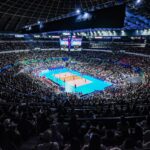
- Cool sweep: How Creamline’s winning formula led to a 7th PVL crown
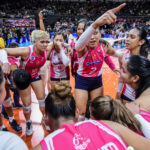
- Pampanga Dragons celebrate 25th anniversary of MBA championship
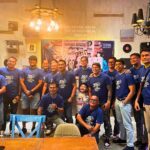
- NBA app launches personalization features, live game experience

- Dante Silverio celebrates 86th birthday in style
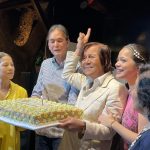
Significance of Crispa’s departure
There’s no denying the PBA was walking on thin ice in the mid-80’s. Apart from the disastrous political and economic situation in the country, the league’s two most popular teams had disbanded. The PBA was turning a new leaf, rewriting a new chapter that could spell further continuity or an untimely demise.
Providentially, it was Manotoc, and later, Rudy Salud (who became Yenko’s chief assistant after Manotoc left the country in 1986) who allowed the PBA to continue and later flourish. Manotoc first brought the excitement back in the PBA by allowing the no harm, no foul rule in 1985. He then disallowed the top big men of the league in 1985 (Ramon Fernandez, Abet Guidaben, Philip Cezar, Manny Victorino) to play for one team. Yoyoy Villamin eventually replaced Cezar in the list in 1987. This was to ensure that all teams would have equal opportunities to win championships without resorting to giving the lowly teams an advantage by hiring taller imports or imports who played simultaneously while the others were allowed to play their reinforcements one at a time.
But the spreading of the Crispa wealth turned out to be one of the best boardroom decisions ever made in league history. The innovative move had a significant impact to the league as all six teams by then were evenly-matched and capable of winning championships. From 1985 to 1988, Great Taste, San Miguel and Tanduay won three titles apiece while Ginebra collared two belts. Shell won its first franchise title in 1990 while Manila Beer folded up after the 1986 season. The dispersal of the players also brought new fans to the other teams, making the franchise build their own follower base. A new rivalry was created – Tanduay and Ginebra – while it was also an opportunity to see who was the better player in a Guidaben vs. Cezar matchup.
More than anything, while Philippine basketball was good to Crispa, Floro also said that “Crispa was good to Philippine basketball.” The family started its basketball sojourn in 1956 as a member of the Businessman Athletic Association before gravitating towards the MICAA two years later. A team that’s no stranger to controversies as they were to championships, the Floros had gone through several peaks and valleys, peaking with two PBA grand slam titles in 1976 and 1983, and none more abysmal than the 1973 MICAA finals game-fixing scandal versus Mariwasa-Akai that led to the suspension of six Crispa players.
While clarifying that economics wasn’t the main consideration for the disbandment, Floro admitted pain in seeing “the team losing by 21 points in a championship game was just too much for his family to bear.” The amiable team manager was referring to Crispa’s last game in the PBA, a Game 5 Finals clincher for the 1984 Invitational championship. The Redmanizers were behind all the way and lost, 127-106, to the Great Taste Coffeemakers and blew what could have been their 14th PBA championship.
